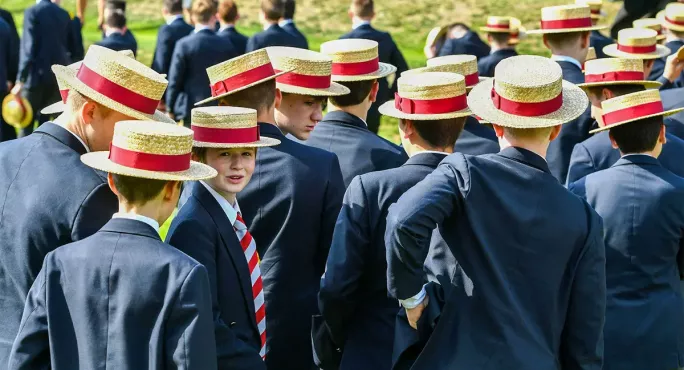Private schools ‘to lose 6% of pupils under Labour VAT rule’

Imposing VAT on private school fees will result in two-thirds of the costs being passed to parents and 35,000 pupils moving to the state sector, the Office for Budget Responsibility (OBR) has predicted.
The OBR, a non-departmental public body, has published an analysis of the government’s Budget, including the estimated impact of Labour’s VAT policy.
“We estimate that around two-thirds of the cost is passed on through higher fees, just less than a quarter is reflected in reduced service provision, and the remainder is absorbed through cost efficiencies and from profits,” the OBR wrote in its assessment published this afternoon.
The OBR forecasts that this would cost the public sector around £300 million - but that the government’s policy will raise £1.7 billion a year by 2029-30.
‘Around 35,000 fewer private school pupils’
It also estimated that the effective VAT rate applied by schools will be 15.4 per cent, which is less than the standard rate as “some input costs will be recovered”.
According to HMRC documents released earlier this month, independent schools will be able to claim back the tax they have paid on capital projects in the last 10 years.
The OBR’s costing predicts that there will be a 6 per cent fall in private school pupils as a result of the VAT policy.
This falls towards the upper range predicted by the Institute of Fiscal Studies, which had forecasted a drop of between 3 per cent and 7 per cent.
“The costing estimates that as a result of the policy in the steady state there will be around 35,000 (6 per cent) fewer private school pupils, reflecting both leavers and, primarily, fewer new joiners,” the OBR said today.
- Budget 2024: what it means for schools
- ISC: Guidance on VAT on private school fees ‘confusing’
- Unions: Delay private school fee VAT charge or lose teachers ‘permanently’
‘Limited’ evidence on demand for private school places
However, the OBR stated that the “main uncertainty” in the costing is the impact of the VAT measure on the number of pupils attending private schools.
This is because there is “limited evidence on how responsive demand for private school places will be to this increase in fees and lower service provision,” it said.
The OBR’s analysis also said it assumes that the likelihood of moving schools will be lower for existing pupils, compared with prospective pupils, as parents will be reluctant to “disrupt” children’s education.
It also added that the policy’s costing does not directly include any additional government spending for the cost of educating pupils who move to the state sector.
The OBR estimated that the “cost of 35,000 additional state sector pupils would be around £0.3 billion”, based on government figures.
The actual additional cost to the government will depend on a wider set of factors, the OBR continued, including overall trends in total pupil numbers and the ability of state schools to absorb additional pupils from the private sector, which is “likely to vary across regions”.
The changes could also affect costs to local authorities related to the provision of education for pupils with education health care plans (EHCPs), the office warned.
Concerns that private schools ‘cannot absorb VAT’
Commenting on the OBR assessment, the Independent Schools Council (ISC) said that the forecast makes it “clear that independent schools cannot absorb VAT”.
“70 per cent of any school’s budget will be on its staff, and so any savings that can be made will be minimal, especially with a rushed mid-year implementation against the advice of experts,” the ISC warned.
“We remain concerned that the OBR, like the IFS before it, has underestimated the number of children who will leave the sector, though it does acknowledge that the evidence in this area is ‘limited’”.
The warning come after the ISC called official guidance on charging VAT on private school fees “not fit for purpose” earlier this month.
Chancellor Rachel Reeves also today confirmed a rise in employers’ national insurance contributions, with higher rates and a lower starting threshold.
Commenting on the Budget, Martin Willis, partner at independent consultancy Barnett Waddingham, said: “We now know that independent schools will not only have to absorb the planned introduction of VAT on fees and loss of business rate relief, but also the increased national insurance rate for employers”.
“This will doubtless be hugely challenging for many independent schools trying to balance their finances,” he warned.
Wraparound care continues to be exempt from VAT
HRMC has also updated its guidance for independent schools on how extra-curricular and before and after school clubs will be impacted by the VAT policy.
“Extra-curricular activities which are educational in nature will be subject to VAT when provided by a private school,” HMRC said.
However, any before or after school childcare, or childcare-based holiday clubs, provided by a private school that consist of care will continue to be exempt from VAT, it confirmed.
For the latest education news and analysis delivered every weekday morning, sign up for the Tes Daily newsletter
Keep reading for just £1 per month
You've reached your limit of free articles this month. Subscribe for £1 per month for three months and get:
- Unlimited access to all Tes magazine content
- Exclusive subscriber-only stories
- Award-winning email newsletters
topics in this article



